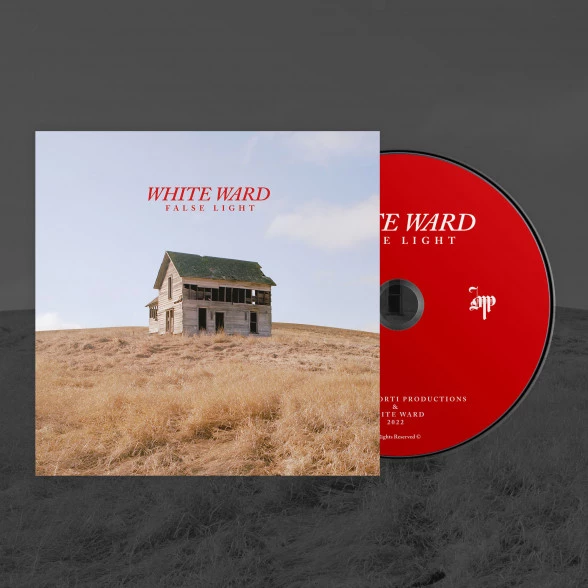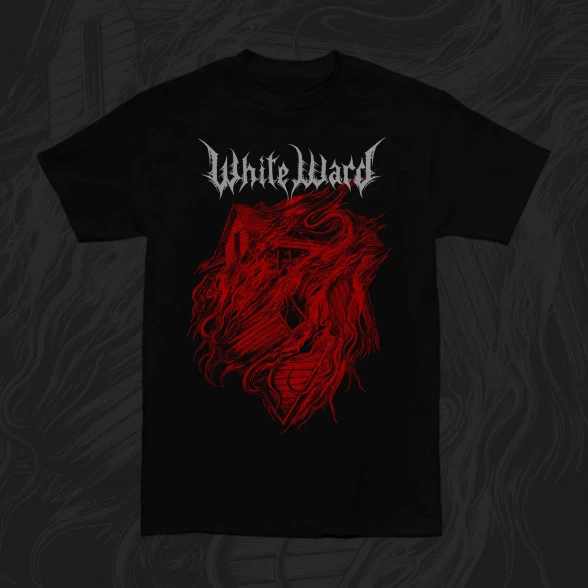Blog search
Artists
- Aara
- Akhlys
- Anfauglir
- Archgoat
- Arkona
- Aversio Humanitatis
- Behexen
- Beneath Moonlight
- Blood Abscission
- Blut Aus Nord
- Bong-Ra
- Cailleach Calling
- Eitrin
- Ershetu
- Godkiller
- I.C.E.
- Inferno
- Insect Ark
- Kaleikr
- Light Of The Morning Star
- Miserere Luminis
- Modern Rites
- Mütterlein
- Óreiða
- Other World
- Pestifer
- Pestilength
- Pestilent Hex
- Plebeian Grandstand
- Pure Wrath
- Selbst
- Servants Of Chaos Festival
- Slidhr
- Sühnopfer
- Taubrą
- The Lovecraft Sextet
- Throane
- Ulcerate
- Waidelotte
- White Ward
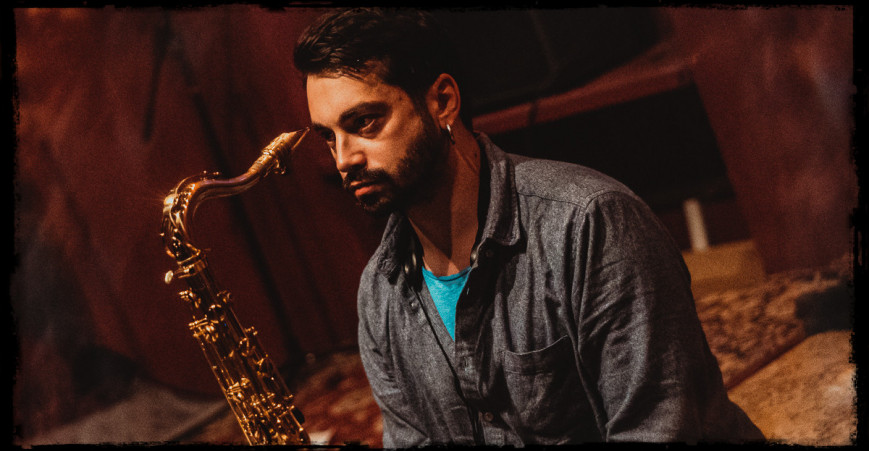
WHITE WARD - Interview with Mykola Lebed
Multi-instrumentalist and composer Mykola Lebed (GHOST CITIES) is one of the prominent figures from the Ukrainian progressive music scene which can be heard on WHITE WARD's latest album. He recorded and also interpreted all keyboard instruments, predominantly the (Rhodes) piano. In a detailed talk with us, he narrates about his involvement in WHITE WARD, his personal approach to music and what Art means to a country defending itself from an aggressor.
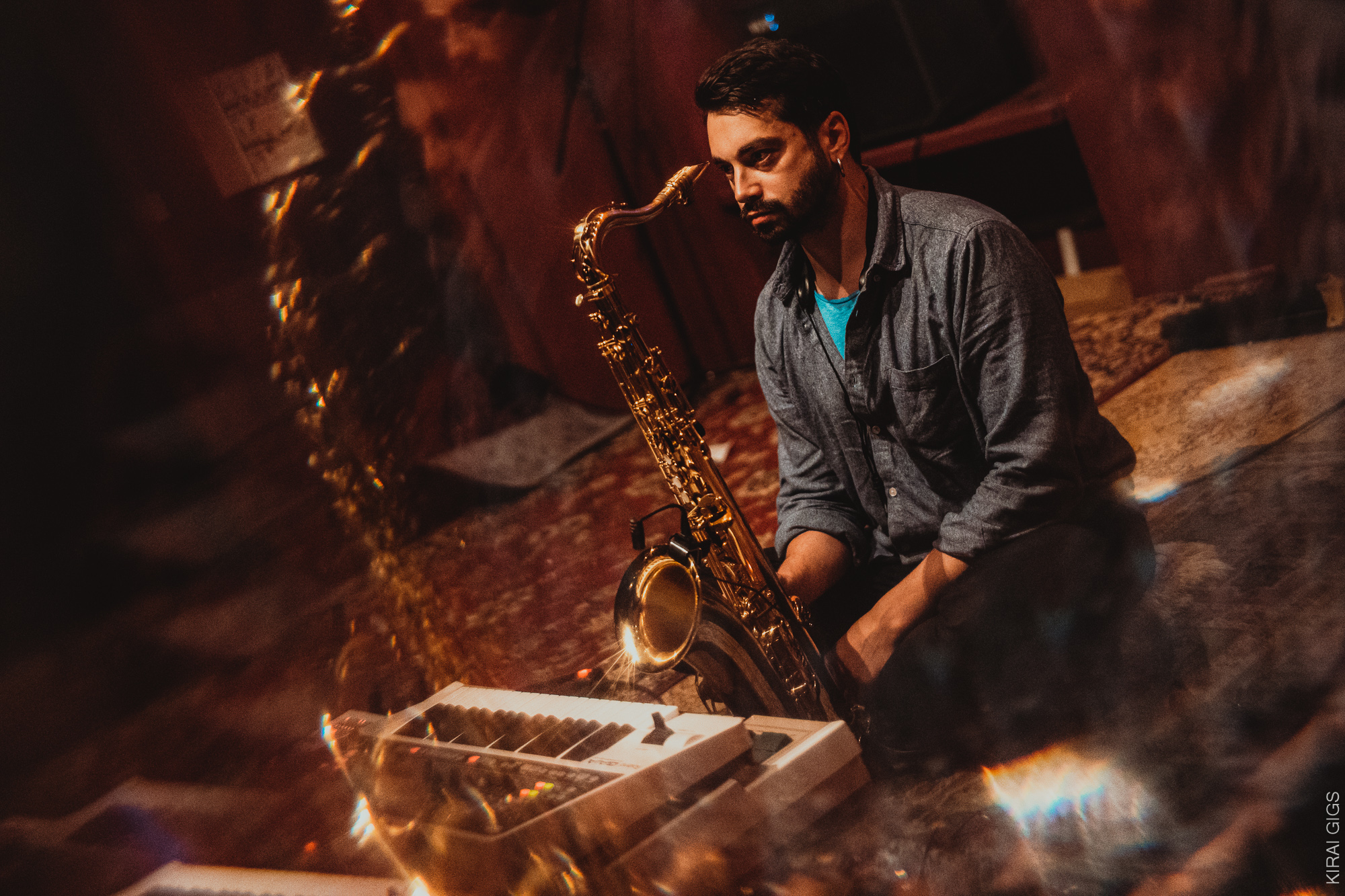
Photo by: Yurii Gryaznov/Kirai Gigs
Q: Hey Mykola, first of all, I hope that amidst all the tragic events and Russian aggression, you are currently relatively safe. You play the saxophone, the piano, and also the keyboard in various projects. Can you tell us how you got into contact with music in the first place?
Hi and thank you! Everything is fine, at least as it could be in the current reality for all Ukrainians. Mostly I played the saxophone in various bands, and since such an instrument is not so common, the sound of the bands itself becomes unusual and unique. By adding the sound of a saxophone to Post Metal, as we did, for example, in SELMA, or to the Proto-Rock of H.SOROR, we made these bands sound originally. They quickly became famous in the Ukrainian underground. Sometimes I think that we did such experiments too early for the Ukrainian music itself – there are much more opportunities that can be developed nowadays than there were years ago. But with H.SOROR we could do a few tours over Europe, playing both Jazz & Metal venues, Punk squats & Art galleries, pubs & night clubs, so I think we definitely had some success in this.
However, sometimes I also played bass guitar, drums and keyboards in different bands as well. Since my father is a former musician, it was no surprise that my parents tried to engage me into playing music. At the age of seven I started to learn playing the piano. Years later I began handling the saxophone. Afterwards, I chose the bass guitar in bands and so on and so forth. Engaging myself with music was always interesting to me. One could say that playing music had become my main interest and a way to express myself since the age of 16. I have the feeling that it is that one thing which I want to do – being an artist. Of course, I had ups and downs, not touching my instruments for a year sometimes, but the feeling that music is my thing never left me. I have seen people burn out and bands break up, but I never had the feeling that I should stop making music. I just need it as much as I need to breathe.
Q: Did you receive a classic training in music and music theory? If yes, which musical traditions or artists, would you say, did inspire you the most?
Indeed, I received a classical education. I took music school and music college, whose main focus lies on artists like Mozart, Bach and others. But I have listened to totally different musicians at the same time. I mixed John Coltrane with a huge amount of Punk/Hardcore/Post Metal/et cetera, discovering similarities in Stravinsky and Mathcore as well as in all the early impressionists and Jazz. Afterwards, I discovered SWANS, THE MARS VOLTA, TERRY RILEY, SUICIDE, PHAROAH SANDERS, MILES DAVIS, the ECM label, FEAR BEFORE THE MARCH OF FLAMES, APHEX TWIN, CAN and Japanese ambient/new-age music… I am fond of the Japanese approach to foreign music. They take it, rethink it and create a new version of it, developing a personal style and sound. You can always say: this is Japanese Jazz or Punk playing when you hear it. This is also correct for North Jazz. The newest example of rethinking music can perhaps be found in African electronics – it just smashes your brains out by combining primitive & tribal rhythms and sounds with Western instruments & traditions… Too many different artists inspired me throughout different times, and I think it is very interesting to find inspiration in totally different genres – to be open and to be curious. For a few years I was working in a night club called Closer with mostly House music playing and it granted me a lot of interesting insights about music as well as electronic dance and non-dance music at all. A lot of Rock/Metal/Jazz musicians stay away from electronic dance music, but there is a lot of things you could learn from it – at least how to keep your audience interested with pretty similar structures and a minimalist approach for hours.
Q: You have been involved with WHITE WARD since their last EP "Debemur Morti". What caught your attention?
My attention was caught by the Art and concept behind WHITE WARD which reminds me a bit of one of my previous bands. I was sure I could contribute to it due to my experience. Taking part in WHITE WARD feels to me like a next step in my own evolution and the development of the Ukrainian music scene. Let's say that two self-sufficient and forefront artists collaborate to use each other's knowledge, create something unique and expand the definition of what could be called Ukrainian music.
Q: Can you tell us more about the collaboration with Yurii and the band? In what compositional phase do you enter the 'game', so to speak? Do you receive the raw versions of the songs and then compose the piano/keyboard parts?
Yurii sends me sheet music and early demos for the songs. The keyboards parts are then created by Yurii himself already. My job is it to play and record the material with some changes. For example, I took a few sounds off, added some additional sounds in other places, increased intensity et cetera – my part was to play the composition as I had the feeling it should sound like. We also had fun while recording the Rhodes piano through the broken Roland Echo for "False Light". In short, I receive sheet music and demos, we go into the studio for a day or two and then I record my parts. More concretely, my parts we recorded in the Lypky studio in Kyiv.
Q: Could you tell us a bit more about the songs you played the piano/the keyboards on? Were there some parts that were difficult to play for you? Were there some parts on which you had the feeling that the composition should be changed?
Since I hear only raw demos before the recording, I guess that I have no final idea of how the songs should sound in their final versions. While we recorded, our dialogues were mostly like: 'Here should also be a sax solo, and here we will add acoustic guitar!' It was not hard technically, but in some way it was hard to express the feelings right – to play softer or harder, not to fall out of tempo, et cetera. Emotional stuff.
Q: Can you, in general, describe for us how you compose keyboard/piano tunes for a composition? Do you have a specific method?
You know sometimes you could create a part in a few minutes and sometimes you could be somewhere riding the escalator in the Metro and you get an idea how a part should sound like. For me, a few first tries are the main points for the next development.
I like the quote of BOHREN & DER CLUB OF GORE that the main challenge is not to add as much as possible, but to leave only the most needed. Also, I like to have fun with pauses and sustained tones. Pauses attract more attention, making people become concentrated on trying to predict what would come next. I like the feeling of space in music, no matter if it is John Cage's '4.33' or a megalomaniac cacophony. If you catch the feeling of how to make it sound monumental, then you win.
In my bands and solo activities, I am acting mostly as an improvising musician. When I am performing as GHOST CITIES, I have no setlist, no tracks – nothing except a few ideas, sketches and feelings. It always challenging since sometimes I am having the same feeling as the audience: I do not know how the sound will now develop. The only difference is that I am on the other side of the instruments. So, my specific method or approach is improvisation.
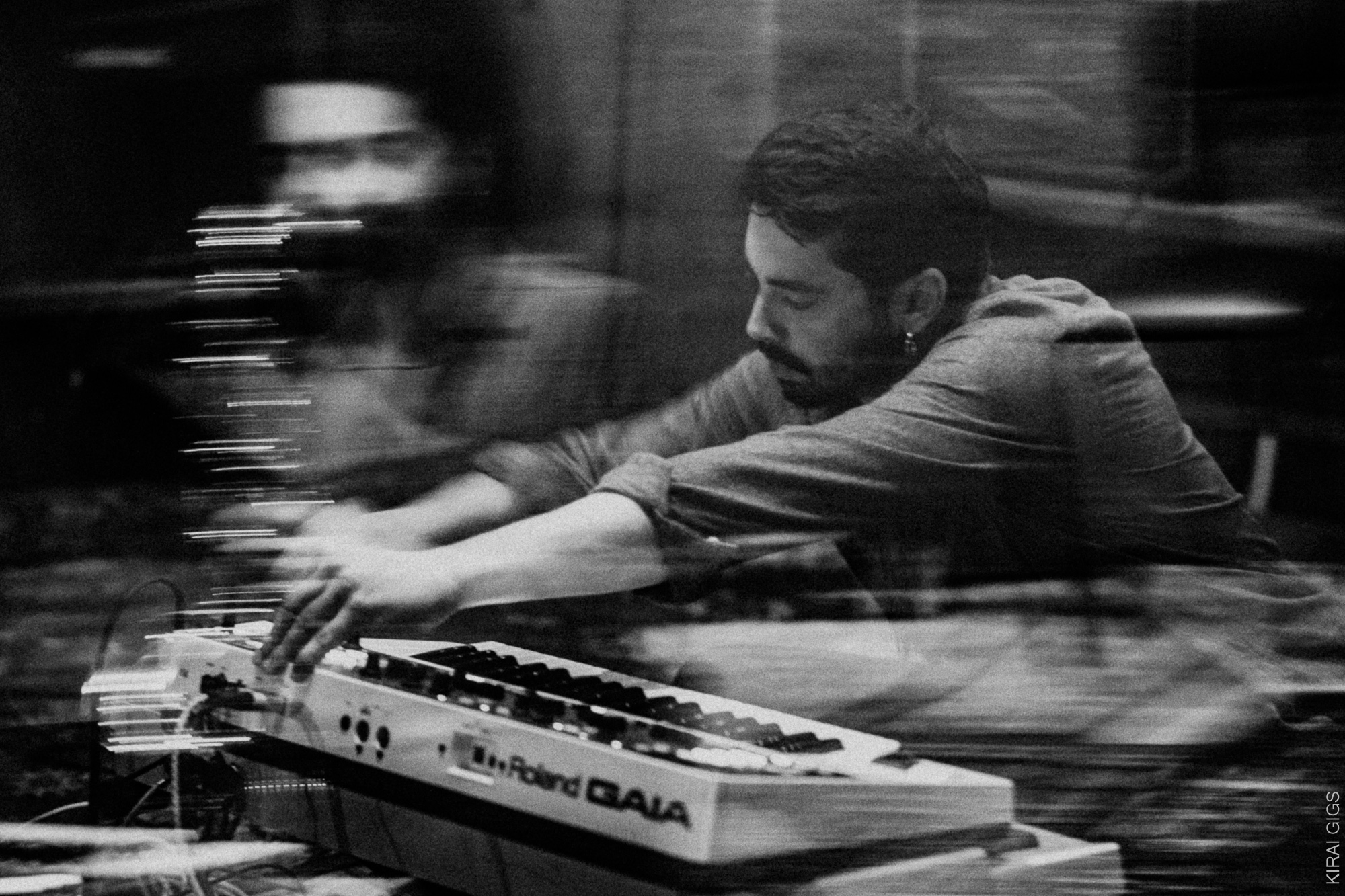
Photo by: Yurii Gryaznov/Kirai Gigs
Q: Could you elaborate for us the specific differences in tonality between a piano and a Rhodes piano? When is which instrument usually the right choice for a song?
The piano sounds grand, tender, and beautiful. The sound of the piano will always grant your music this kind of vibe. And the overtones on the sustained pedal will make it sound even more beautiful. A Rhodes piano, however, is fancier and noir. Which instrument to choose when depends on what feeling you want to express. For WHITE WARD, it is important not to make my parts sound too epic. That would be pathetic. Metal music, sadly, often sounds and looks too funny, haha!
Q: If you had to describe the Art of WHITE WARD in your own words, how would you do it? What is, for you, the key essence of their music?
I would describe it with a picture: it is like you are strolling through the woods in the mountains while the storm is becoming more intense and harsher. But all this happens inside of you. The themes of their lyrics are resonating with me very much. It can be a song about personal feelings, about the grace of the nature, or also about Kateryna Handziuk – the activist from Kherson (currently occupied and homeland of Andrii from WHITE WARD, if I am not mistaken) who was brutally killed by an acid attack because of her position and fights with local pro-Russian and pro-criminal authorities. We are living in the same reality, we are facing the same problems, and we are pretty connected because of this situation. Part of the WHITE WARD guys I know since years, and their other bands like SIGNALS FEED THE VOID, GRAVITSAPA and old albums of ATOMIC SIMAO are definitely something you need to check.
Q: If you take a listen to "False Light", is there a specific song which is very dear to your heart?
Beside the ones I take part in, it is 'Phoenix'. I believe there is a crucial theme in the lyrics, to never stand aside.
Q: Despite of the horror taking place in Ukraine, you are currently playing concerts with GHOST CITIES in various parts of your country. How is it for you as an artist and for the crowd to be part of such a concert? What message would you like to spread by playing concerts now?
For the last two months I have toured and travelled across all of the country, sometimes being very close to the front, playing in Odessa and Dnipro which are two cities closest to the war zone (apart from Mykolaiv and Kharkiv that are being shelled every day). Once, my show in Kyiv was on the day before Russians hit the residential buildings with rockets, so I woke up and saw this with my own eyes – burned and destroyed homes in the city center. I lived in Kyiv for a few years, I have spent a lot of time in the district that was under the last attack, and it is quite hard to see your home burned and destroyed. Living in Ukraine was never quite easy, and it is really mentally hard now. There is no safe place in Ukraine at the moment. No matter how far from the front you are, rockets hit almost all big cities, and they hit shopping malls, culture centers, hospitals and residential buildings. You are becoming anxious, sleepless, and deprived. With the amount of horror we face each day, you just become senseless, and you are finding yourself totally exhausted, with zero sense of security, in constant doubts if you should you go to the bomb shelter when you are hearing air alert or if just do not pay attention and keep on doing your stuff.
My tour included ten cities, from West to East, from North to South. It was very spontaneous. I was invited to one charity show, and while I played this show, I got the invitation to play another one. So, I decide I should go for more. I was tired of sitting at home, facing personal problems. The war turned our lives up and down, your loved ones are fleeing, you are not able to cross the border and you could be called to join the forces anytime because you are a man. You begin to understand that you have only today. So, I thought that what I want to do today is play music and be on the road. The road was always like a healing for me.
All in all, my tour was a charity tour. I did not take any compensation from the venues and bookers, all the funds we were able to gather we donated to the army and volunteers. That is the main message. We should not stand aside, we should fight any way possible, we should be strong and keep on doing what we are doing. Russia is a slavery state, Ukraine is always free.
No products
To be determined Shipping
0,00 € Total
